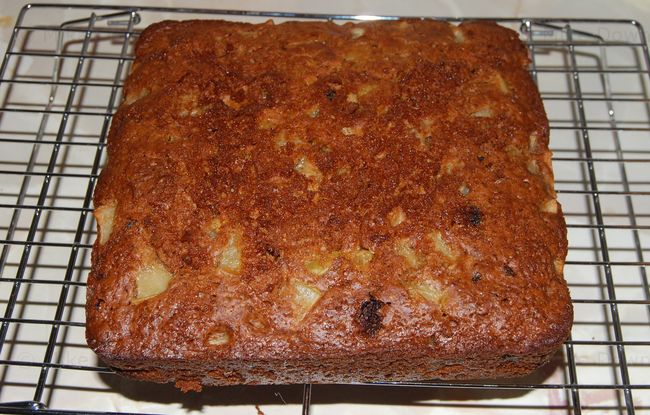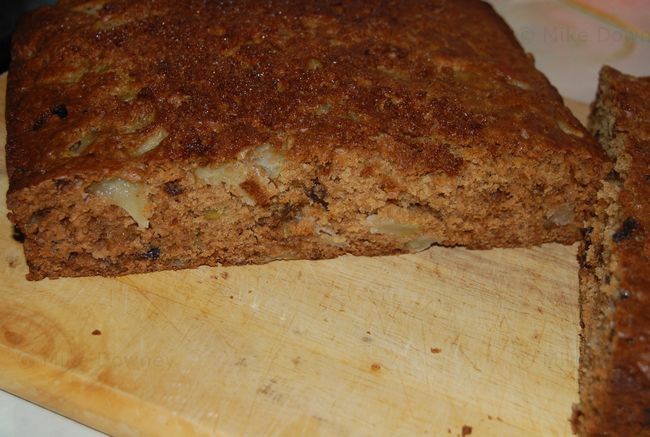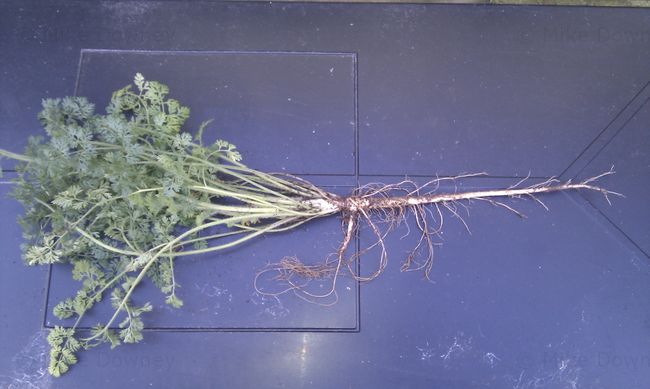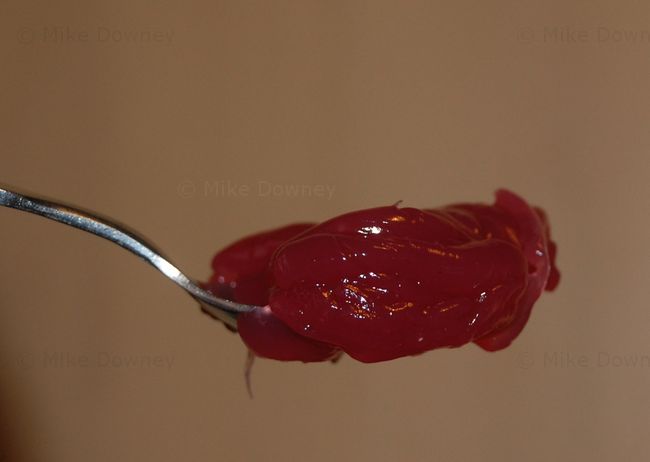Herman the German: Sourdough cake |
Story location: Home / Blog / food_and_drink / |
| 19/Mar/2012 |
Just over a week ago I exchanged sourdough starters with a colleague in work. I gave her some of my wild yeast starter and in return I was given a tub of Herman starter.
The Herman starter mix is made using flour, sugar, milk and yeast. Unlike the traditional bread starter, which ideally should be fed every day, the Herman starter is only stirred each day and fed on the 4th and 9th days. The feed consists of equal quantities of sugar, milk and flour.

On the 10th day, the cake is ready to make. Take 1 cup of starter and add all the other ingredients, mixing well to make a stiff batter. As usual, I made a few substitutions based on what we had in the house at the time. I used:
- 1 cup of sugar
- ½ tsp salt
- 2 cups of plain flour
- ⅔ cup of vegetable oil
- 2 medium eggs
- 2 tsp vanilla essence
- 2 medium sized apples, chopped but not peeled
- 1 cup of dried mixed fruit
- 1 tsp of ground cinnamon
- 1 tsp of mixed spice
- 2 tsp baking powder
I poured the mixture into a couple of loaf tins and sprinkled them with demerara and a little melted butter. I then covered them loosely with foil before baking them at gas mark 4 (180 °C). One of the cakes was ready after an hour, the other was in a deeper tin and took nearly twice as long.

The apples help to keep the cake nice and moist. I think it would work just as well with pears, and possibly using apricots instead of the mixed fruit.
Wild Roots |
Story location: Home / Blog / food_and_drink / |
| 11/Mar/2012 |
Last year I bought a pack of seeds from Garden Organic at Ryton. It was described as 'Edible Leaves, Roots and Shoots' and contained a collection of wild plants which are commonly described as weeds but which are edible. I planted the seeds in a tub in the garden and last year I made some crispy seaweed from some of the leaves, and managed to save some Wild Mustard seeds from one of the plants which grew.
I left the plants over the winter but yesterday I decided to dig them up so I could reuse the tub for a more productive crop this year. I found two large roots:

This plant turned out to be Wild Carrot. I washed the root and had a chew on a small piece. It was very tough and fibrous but did have a slight carrot taste.

It took a bit longer to identify this but I managed to work out that it was Common Mallow. This is a relative of the Marsh Mallow, which gave its name to the soft and fluffy sweet. It is possible to boil the roots to extract a gelatinous substance which could possibly be used to make a version of the original marshmallow so today I decided to give it a go.
I peeled and chopped the root then simmered it in a small amount of water. I then whisked the slightly gloopy water with some caster sugar, vanilla essence and pink food colouring. The mixture was a bit runny and kept splashing everywhere so I cheated by whisking in some cornflour and returning it to the pan.

The end result was a soft sweet tasting jelly which did not resemble an actual marshmallow sweet at all.
Earlier today we finished watching the Indian Doctor, which is a BBC TV programme which was on every day last week. I don't know why the BBC decided to show it during the day on weekdays, when it would be much more suitable as a Sunday evening show, and would almost certainly have higher audiences. At least there is the iPlayer on-line catch-up which let us watch it without having to bother setting the video.
The series features Sanjeev Bhaskar as the eponymous doctor, working in a Welsh mining village. The second series covered a smallpox outbreak in the village and features a lying hypocritical preacher, fresh from work in Africa, who tried to hinder the doctor at every step. I can almost imagine the Daily Mail newspaper working itself up to a fury over the storyline with its pro-vaccine and anti-christian sentiments.
The Daily Mail seems to be the UK representative of the American right wing, being very pro-christian and anti-science. The paper regularly contains stories dismissing global warning and sneering at any scientists who believe in it. It is also very favourable towards alternative medicine even when there is no evidence to support it, and regularly espouses the benefits of 'detox', even though the latter is based on myth and lies and is no better than simply eating healthily for a while.
At least the paper doesn't appear to have joined the anti-vaccine movement though. A quick search of vaccine related stories on the website all seem to be in favour of vaccines to prevent disease. For that we should at least be grateful.
